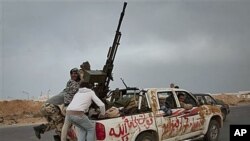Residents of eastern Libya under the control of opponents of leader Moammar Gadhafi are reacting with approval to President Barack Obama’s remarks Monday night on the international coalition’s role in their country’s conflict. But many say they wish the coalition would do more to help them.
A spokesman for the Provisional Council governing eastern Libya, Essam Gheriani, said Tuesday that Obama’s message sought to balance the needs of the Libyan opposition with the expectations of the international community and American people.
"He has to comply with the resolution of the Security Council number 1973. The imposition of the no-fly zone was accomplished. The protection of the civilian population is being carried out quite well. Benghazi was saved, actually, by the strikes carried here out last Saturday," said Gheriani.
Gheriani expressed concern, however, over the siege of Libya’s third largest city, Misrata. He said it has been virtually sealed off by pro-Gadhafi troops and is facing a humanitarian crisis due to a lack of food and medicine.
Other residents here said they wished the international coalition would go further and provide arms to the opposition. They said otherwise resistance will be long and hard against the Libyan leader’s better trained and better equipped forces.
Lawyer Ramadan Shembesh disagreed with the desire expressed by several Western leaders for a peaceful end to Gadhafi’s 41-year-old rule. "Gadhafi will never leave peacefully. We know that. And he said so. From the beginning he said, 'I will never go out of the country. I will stay until the last drop of my blood.'"
Engineer Farage Omar, who was a political prisoner for two years, said he understood the concerns, especially in the Arab world, over any foreign military intervention in the region. He said Libya’s situation, though, is different from countries like Afghanistan or Iraq.
"Now we feel that they [the coalition] have really fulfilled the humane part that we deal with and they understand us. And I wish they continue with this, not just until after Gadhafi goes, but support us until we make a democratic country that stands with strong feet on the ground."
Omar said most Libyans are seeking the establishment of democratic institutions that will allow them to choose their leaders and form of government and live in freedom.




